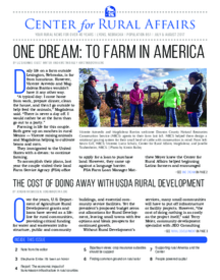Note from the Editor
This edition of our newsletter focuses on our value of widespread OWNERSHIP of small businesses, farms, and ranches by the people who work them.
In our executive director’s essay, he outlines our agenda to combat capital control by spreading small business ownership in rural communities.
We helped Vicente Acevedo and Magdalena Barrios obtain their land, adding one more family farm back into the rural landscape, and allowing the couple to achieve their ownership dream.
We hear about the solar industry in Iowa, and how one school district uses solar to cut energy costs, taking ownership of their electricity.
Our friends Bill Furlong and Mark Leonard tell us about capping crop insurance subsidies, which would curtail public spending and better support small and mid-size farms.
In a recent report, our staff studied three transmission line projects. Tax revenue from this new infrastructure is money invested in local governments.
Lastly, we hear from a community development specialist on infrastructure projects in small communities. Many water and sewage systems owned by rural towns need repaired or replaced. USDA Rural Development is able to assist these communities, like Oakdale, Nebraska, that have been turned down by fiscal agents or local banks for financing. Rural Development is now on the chopping block, which would cause many rural residents to suffer.
Ownership is just one of the many values that our organization bases our work on. We believe these values reflect the best of rural America.
Inside this issue
From the executive director: people powered capital – Almost weekly, I read surprising new statistics about capital concentration. The eight richest people in the world now control as much capital as half of the world’s population. The richest 158 families in the United States were the source of more than 50 percent of early cash in the last presidential campaign cycle. The world’s largest company is worth half a trillion dollars. In a world where fewer and fewer individuals control more and more capital, efforts to rebalance the scales of capital become ever more important. At the Center, we attack this problem through public policy and by operating a revolving loan pool to finance small businesses in rural Nebraska.
One dream: to farm in America – Daily life on a farm outside Lexington, Nebraska, is far from luxurious. However, Vicente Acevedo and Magdalena Barrios wouldn’t have it any other way. Farming is life for this couple.
The cost of doing away with USDA Rural Development – Over the years, U.S. Department of Agriculture Rural Development grants and loans have served as a lifeline for rural communities, providing critical funding for water and wastewater infrastructure, public and community buildings, and essential community service facilities. Yet the president’s proposed budget zeros out allocations for Rural Development, leaving small towns with few options and bleak prospects for continued growth.
Bipartisan views: crop insurance subsidies should be capped – Crop insurance is the current cornerstone of federal support for farms. As farmers and crop insurance customers, we support a strong farm safety net. But we also believe the crop insurance program can be improved.
Finding common ground on rural solar – As an active and idealistic college student, I traveled to Washington D.C. to participate in a national lobby day for young people who wanted to talk with senators and representatives about supporting renewable energy. I sensed then, and I now know, that investing in renewable energy can help revive our economy, improve national security, and provide a myriad of environmental and public health benefits.
Supporting rural America and the Center – Together, in the first half of 2017, we accomplished so much because of generous support from donors like you. Thank you. Recent exciting developments make it possible for your giving to have an even greater effect. Please consider these options as you think about fall and holiday giving.
Stephanie Enloe: it has been an honor – We said goodbye to Stephanie at the beginning of July. We wish her well in her future endeavors. During the past two and a half years, I’ve had the opportunity to work on some fascinating issues — renewable energy, water quality, Farm Bill policy, and climate change. Now, I’m off to graduate school at Cornell University.


